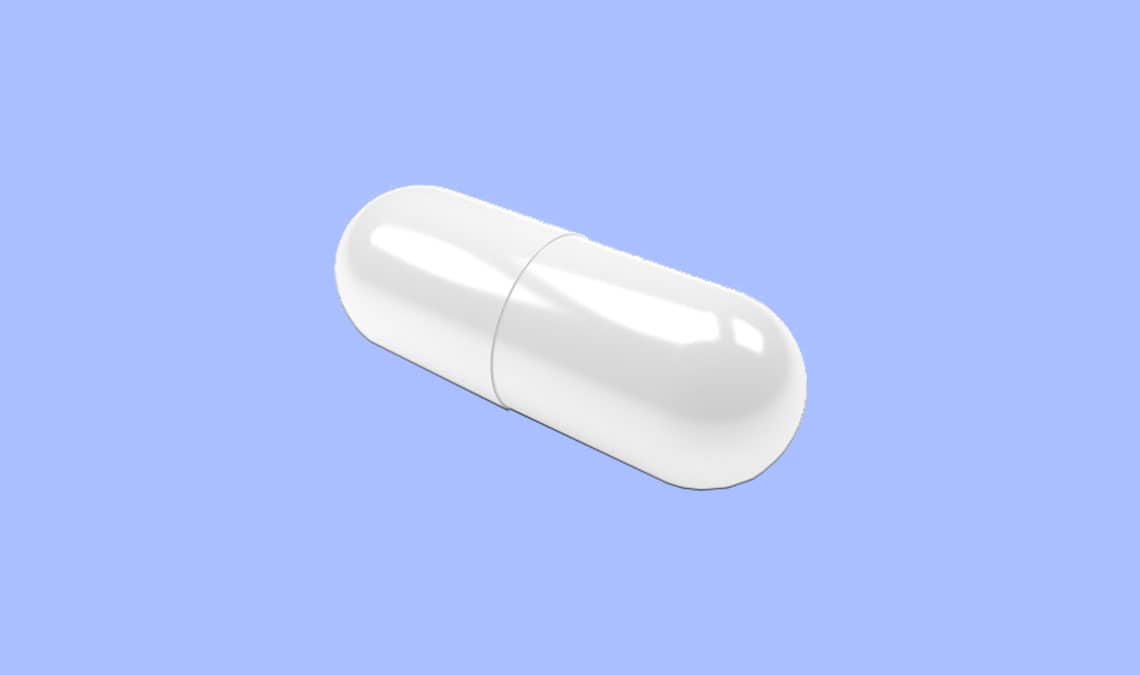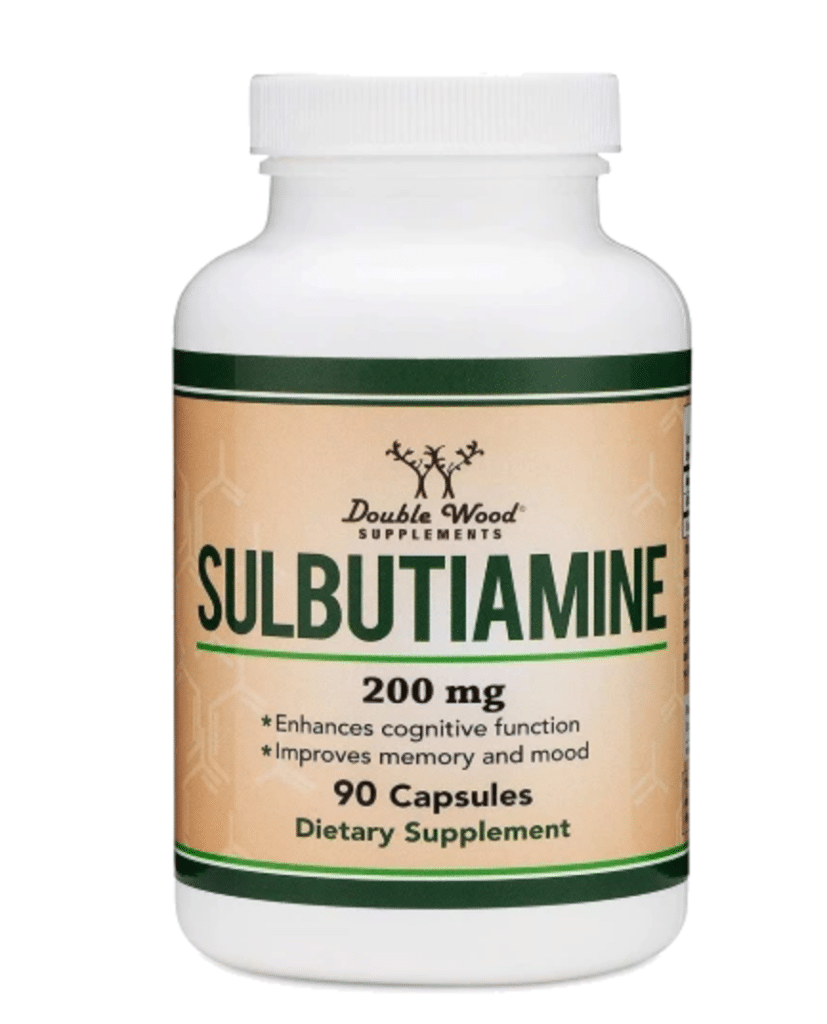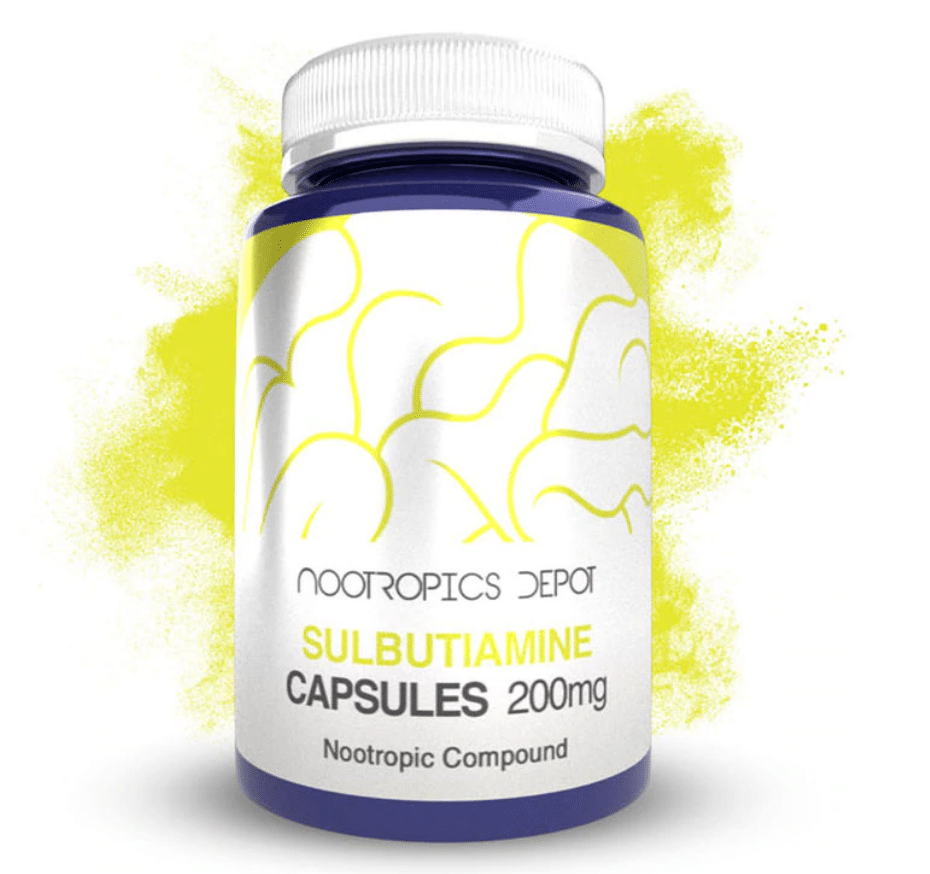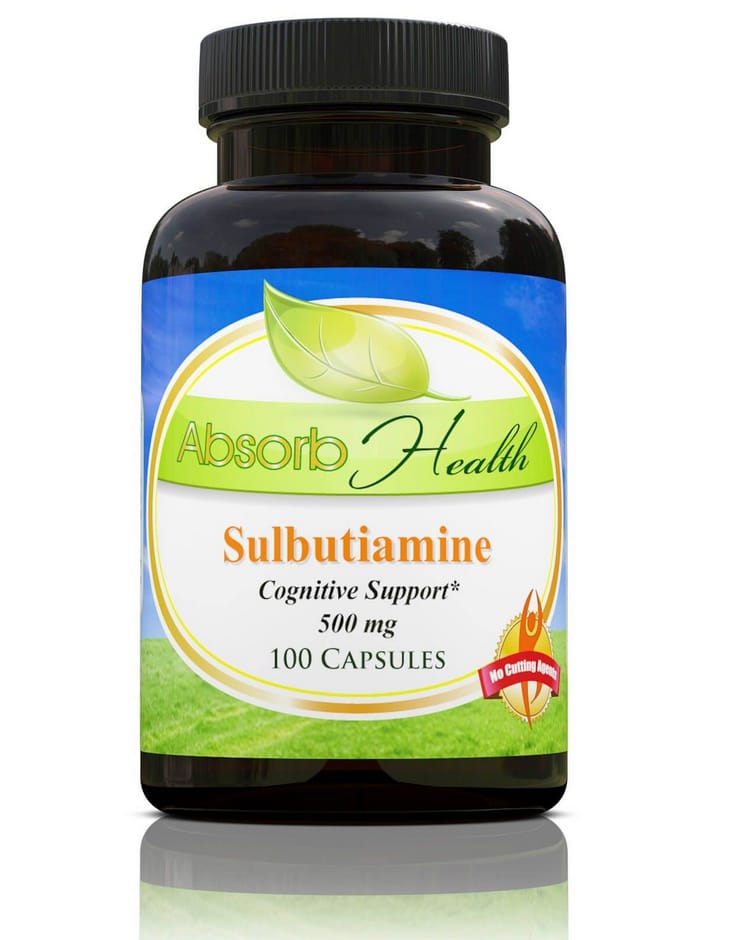
Sulbutiamine is a synthetic form of thiamine (vitamin B1), consisting of two thiamine molecules joined together. Unlike thiamine which is water-soluble, sulbutiamine is fat-soluble and crosses between biological membranes, especially into the brain, much more efficiently. Sulbutiamine is known for its anti-fatigue (associated with thiamine deficiency), nootropic and antioxidant effects, and is normally consumed in sulbutiamine capsules.
Symptoms Of Thiamine (B1) Deficiency
Thiamine is quickly consumed by your body to maintain important bodily functioning. For example, thiamine converts into the active ingredient thiamine pyrophosphate to enable carbohydrate metabolism and healthy nerve function. However, thiamine cannot be stored long-term within the body. Therefore to replenish thiamine, you need to consume a significant amount of it every day, which many people fail to do.
People deficient in thiamine suffer from an array of symptoms including neurological issues (such as fatigue and weakness – known together as asthenia), cardiological issues (oedema and ventricular failure) or just general malaise. Neurological issues especially can affect concentration and induce brain fog—a key symptom affecting your productivity.
Cohorts especially vulnerable to thiamine deficiency include alcoholics, pregnant women, highly active people, dialysis patients and patients with gut issues. This is due to either increased metabolic and physical demand on the body which increases the ingestion of carbohydrates, or impaired thiamine absorption, thus more thiamine is needed. Further, people on restricted diets can miss out on eating enough thiamine—for example, patients post-bariatric surgery.
Sulbutiamine Benefits
Sulbutiamine offers various anti-fatigue, nootropic and antioxidant properties, which carry numerous benefits. For example, in cell cultures, sulbutiamine shows neuro-protective properties by preventing oxidation—an initiator of cell death. This finding carries implications for the possible prevention of symptoms associated with neurodegenerative disorders like Parkinson’s disease.
The most common medical reason for people to visit their doctor is asthenia—a combination of fatigue and weakness. Sulbutiamine is thought by scientists to be an effective anti-asthenia compound due to its ability to cross biological membranes and target brain regions which directly cause asthenia. So far, both rodent models and clinical trials have shown positive results for treating fatigue symptoms. Further, in terminal conditions like multiple sclerosis, sulbutiamine has been particularly effective in treating associated chronic fatigue.
Sulbutiamine is often described as a nootropic due to its beneficial effect on fatigue and memory. In early-stage Alzheimer’s patients, sulbutiamine increases attention span and memory. Some users even state a feeling of euphoria within the first week of ingesting sulbutiamine, possibly because they are so deficient in thiamine. Sulbutiamine is also widely reported to improve motivation.
This gives it potential as a performance supplement for athletes—a currently debated topic. Sulbutiamine is highly similar to the main metabolite of the anabolic steroid boldenone, and some less-sensitive tests may even mistake it for boldenone. One Japanese study from 1999 also suggests that thiamine supplements (not necessarily just sulbutiamine) enhance muscle growth, at least in chickens.
Scientists are now exploring sulbutiamine as a supplement to anticancer strategies. Cancer cells proliferate due to the over-expression of enzymes which inhibit mitochondrial function. Sulbutiamine may prevent the activation of these enzymes to restore healthy mitochondrial function. So far, sulbutiamine’s cancer potential remains speculative, however theoretically it appears possible.
Sulbutiamine Dosage – What’s The Right Sulbutiamine Dose For You?
People are recommended to take around 400 mg daily, split into two doses (200mg in the morning and 200mg after lunch). There is evidence that sulbutiamine may affect sleep patterns, so avoid taking sulbutiamine later in the day. Only people who suffer from digestive issues should take more than 400mg daily —a sulbutiamine dose exceeding 400mg may worsen your mood due to the dip in dopamine caused by excessive sulbutiamine.
Some people anecdotally report tolerance (reduced efficacy) to sulbutiamine if they are taking the supplement regularly. To prevent tolerance, it may be preferable to take sulbutiamine on weekdays and refrain from doing so on the weekend.
As sulbutiamine is lipophilic, we advise taking sulbutiamine with a little bit of fat (such as coconut oil) to improve digestion. In addition, sulbutiamine tends to be in capsule or tablet form for easy ingestion. You can get sulbutiamine powder, which theoretically is preferable for people with compromised absorption issues in their digestive system, however the taste is awful. Sulbutiamine is also available in sublingual form, though the same disadvantage applies.
Sulbutiamine Side Effects
As mentioned, sulbutiamine can sometimes cause short-lived, mild euphoria in new users. On the other hand, it decreases dopamine receptor sites in the prefrontal cortex at high doses. This in turn causes a noticeable dip in mood if too much sulbutiamine is consumed. After consistent dosing however consumers report a decrease in these mood swings once their bodies have developed tolerance for sulbutiamine.
Other side effects in human clinical trials have been noted, though these are few and far between: nausea, headache, insomnia, diarrhoea, tremor and drowsiness. It may be that these side effects are placebo effects and not true to sulbutiamine, or that they were caused by disease, since they were seen in sick patients. Currently there is no research showing a difference in side effect prevalence between 400mg and 600mg dosages. In practice, users rarely go over 400 mg, and dosages over 400 mg are generally recommended against.
Looking To Buy Sulbutiamine Online? Here Are The Best Sulbutiamine Supplements

Our Recommendation
Double Wood Supplements Sulbutiamine (200mg)
Double Wood’s sulbutiamine supplement is a clean product, providing full disclosure on their laboratory results from product testing and their certificate of analysis. Made in the USA, this product is much cheaper for US residents. Each capsule contains 200 mg and they recommend 1-2 capsules per day—in line with safe dosage recommendations. These capsules are non-GMO, gluten-free and there are 90 per container. With 4.7/5 star reviews on their website and a 100% money-back guarantee, this product is very appealing.

Another Great Sulbutiamine Capsules Option
Nootropics Depot Sulbutiamine (200mg)
Nootropic Depot’s Sulbutiamine also contains 200mg per capsule/tablet, yet they offer more choice on container size—90/180 for capsules and 60/120 for tablets, depending on your preference.
Nootropics Depot sulbutiamine is lab-tested and verified for purity and identity.
Along with fast shipping and positive reviews, this demonstrates a clean, professional end product.

Best High Dose Sulbutiamine
Absorb Your Health Sulbutiamine (500mg)
If you are suffering from digestive problems, Absorb Your Health’s Sulbutiamine is for you. At a higher dosage of 500 mg per capsule, you are almost certainly going to feel a difference upon consuming this product—and if you don’t, you will receive 100% of your money back. Unfortunately, this product is not vegetarian-friendly and the lack of reviews is concerning. They do however provide their certificate of analysis and third-party lab-testing to promise a genuine, pure product.
